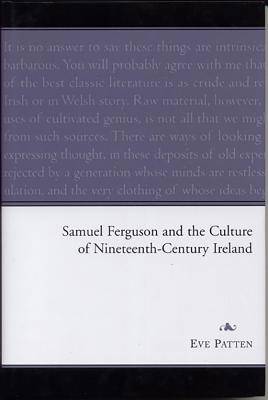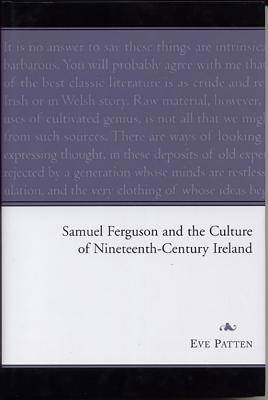
Door een staking bij bpost kan je online bestelling op dit moment iets langer onderweg zijn dan voorzien. Dringend iets nodig? Onze winkels ontvangen jou met open armen!
- Afhalen na 1 uur in een winkel met voorraad
- Gratis thuislevering in België vanaf € 30
- Ruim aanbod met 7 miljoen producten
Door een staking bij bpost kan je online bestelling op dit moment iets langer onderweg zijn dan voorzien. Dringend iets nodig? Onze winkels ontvangen jou met open armen!
- Afhalen na 1 uur in een winkel met voorraad
- Gratis thuislevering in België vanaf € 30
- Ruim aanbod met 7 miljoen producten
Zoeken
€ 69,95
+ 139 punten
Omschrijving
Samuel Ferguson (1810-86) was one of 19th-century Ireland's most influential writers, but his politics and cultural agenda have never been fully understood. This book draws on his neglected prose writings to illuminate his layered ideology, and to expose his various determining contexts, including his native Belfast and its Scottish Enlightenment hinterland, the Dublin University Magazine with its fraught literary-political protocol, the communities of the Ordnance Survey Commission, the Nation, and the Royal Irish Academy. Ferguson's guiding agenda is shown to be that of a civic idealism - a grassroots alternative to polarized political trajectories and a compelling ethos for a conflicted Irish Protestantism. The result is both a portrait of an individual in his time and a detailed engagement with Irish cultural politics from the Union to the Revival.
Specificaties
Betrokkenen
- Auteur(s):
- Uitgeverij:
Inhoud
- Aantal bladzijden:
- 207
- Taal:
- Engels
Eigenschappen
- Productcode (EAN):
- 9781851828517
- Verschijningsdatum:
- 10/12/2004
- Uitvoering:
- Hardcover
- Formaat:
- Genaaid
- Afmetingen:
- 159 mm x 241 mm
- Gewicht:
- 462 g

Alleen bij Standaard Boekhandel
+ 139 punten op je klantenkaart van Standaard Boekhandel
Beoordelingen
We publiceren alleen reviews die voldoen aan de voorwaarden voor reviews. Bekijk onze voorwaarden voor reviews.











